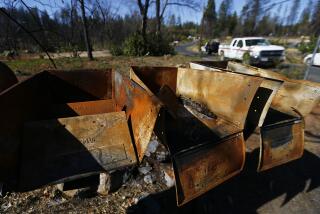Worker coverage costs jump
- Share via
If gas and milk price hikes seem steep, check out health insurance premiums. They have increased 10 times faster than incomes in recent years, a study shows.
Workers with job-based coverage for their families saw earnings rise 3% from 2001 to 2005, while their health insurance premium contribution increased 30%, according to the study by researchers at the State Health Access Data Assistance Center at the University of Minnesota.
The average cost nationally of family coverage during the period increased nearly $2,500, to $10,728 from $8,281. The average cost for job-based family coverage in California increased more than $2,650, to $10,551 from $7,898.
“Providing insurance coverage takes a bigger bite from the family budget every year,” said Risa Lavizzo-Mourey, chief executive of the Robert Wood Johnson Foundation, which helped fund the research.
Mohit Ghose, a spokesman for America’s Health Insurance Plans, the trade group representing the insurance companies, said the study showed the need for controls on the rising costs of drugs, medical devices and hospital care.
He said it should encourage regulators and lawmakers to give insurers the flexibility to offer plans with fewer mandated benefits, resulting in more affordable premiums.
“The aim is keeping them in,” Ghose said. “The worst-case scenario would be that employers would drop coverage altogether.”
The study found that was already a big problem. Between 2001 and 2005, more than 30,000 of the 3.6 million private-sector employers offering health insurance as a benefit to workers dropped it.
As a result, the number of people in private-sector jobs that offered health insurance benefits declined by more than 4 million, and the number of people with private insurance fell by 2.4 million, or 6%, the study found.
The study is one of several out this week examining problems with and the erosion of private health insurance. On Monday, another study warned that the worsening economy would put pressure on government health coverage programs, such as Medi-Cal.
Each percentage-point rise in the nation’s jobless rate could add 1.1 million people to the ranks of the uninsured, according to the study by the Urban Institute for the Kaiser Family Foundation.
That study also found that 7% of Americans said they or someone in their household decided to marry in the last year so they could get healthcare benefits via their spouse.
The University of Minnesota study released Tuesday found that the proportion of insurance premiums workers paid for job-based family coverage between 2001 and 2005 held steady at 24%, with employers picking up the balance.
The latest study was fresh evidence of the need for reform, said Anthony Wright, executive director of Health Access California, a statewide healthcare consumer advocacy coalition.
In California, “even though health reform stalled earlier this year, the need and urgency for reform has not,” Wright said. “Californians continue to face increasing costs and they worry if their coverage will be there for them when they need it. We need reform to provide Californians more security so they have the healthcare they care so much about.”
--
More to Read
Inside the business of entertainment
The Wide Shot brings you news, analysis and insights on everything from streaming wars to production — and what it all means for the future.
You may occasionally receive promotional content from the Los Angeles Times.










